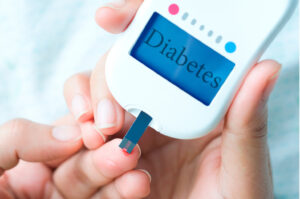Diabetes is a chronic metabolic disorder characterized by elevated blood sugar levels due to either insufficient insulin production or the body’s inability to effectively use insulin. It affects millions of people worldwide and requires careful management to prevent complications and maintain overall health. In this comprehensive guide, we’ll explore the definition of diabetes, its causes, symptoms, types, preventive measures, and commonly asked questions.

What is Diabetes?
Diabetes occurs when the pancreas either does not produce enough insulin (a hormone that regulates blood sugar) or when the body cannot effectively use the insulin it produces. This causes a build-up of glucose in the blood, resulting in high blood sugar.
Causes of Diabetes
To comprehend diabetes, it’s crucial to delve into how the body normally utilizes glucose and the role of insulin.
How Insulin Works:
Insulin is a hormone made by your pancreas that plays an important role in controlling your blood sugar levels.
- Insulin Release: The pancreas secretes insulin into the bloodstream in response to elevated blood sugar levels.
- Facilitating Sugar Entry: Insulin facilitates the entry of sugar into cells, where it serves as a source of energy.
- Blood Sugar Regulation: Insulin works to lower the amount of sugar in the bloodstream, maintaining it within a normal range.
- Dynamic Regulation: As blood sugar levels decrease, insulin secretion from the pancreas also decreases, ensuring a balanced glucose level.
The Role of Glucose:
Glucose, a type of sugar, serves as a vital energy source for cells, including those in muscles and tissues.
- Sources of Glucose: Glucose is derived from two primary sources – food and the liver.
- Absorption and Utilization: Sugar from food is absorbed into the bloodstream and transported into cells with the aid of insulin.
- Liver Function: The liver stores and produces glucose, releasing it into the bloodstream as needed to maintain optimal glucose levels.
- Glycogen Breakdown: When glucose levels dip, especially during fasting or between meals, the liver breaks down stored glycogen into glucose, ensuring a steady supply for energy needs.
Other Causes of Diabetes:
While the precise cause of most types of diabetes remains elusive, it is characterized by elevated blood sugar levels due to insufficient insulin production by the pancreas. Both type 1 and type 2 diabetes are believed to result from a combination of genetic predisposition and environmental factors. However, the exact factors contributing to diabetes development remain unclear, necessitating further research into its etiology.
Understanding the intricate interplay between insulin, glucose, and the body’s metabolic processes is essential for comprehending the underlying causes of diabetes and developing effective management and prevention strategies.
Diabetes Symptoms

Common symptoms of diabetes include:
- Increased thirst and urination
- Unexplained weight loss
- Fatigue
- Blurred vision
- Slow wound healing
- Recurring infections
- Tingling or numbness in the hands or feet
Types of Diabetes
Diabetes is a complex metabolic disorder characterized by elevated blood sugar levels. There are several distinct types of diabetes, each with its unique characteristics and underlying causes.
1. Type 1 Diabetes:
Type 1 diabetes, also known as juvenile diabetes or insulin-dependent diabetes, typically develops during childhood or adolescence. It results from the autoimmune destruction of insulin-producing beta cells in the pancreas. People with type 1 diabetes need long-term insulin therapy to control their blood sugar levels.
2. Type 2 Diabetes:
Type 2 diabetes, the most common form of diabetes, usually develops in adulthood. It occurs when the body becomes resistant to insulin or fails to produce enough insulin to meet its needs. Type 2 diabetes can often be managed through lifestyle modifications such as diet and exercise, oral medications, or insulin therapy.
3. Gestational Diabetes:
Gestational diabetes develops during pregnancy and usually resolves after childbirth. However, it increases the risk of developing type 2 diabetes later in life for both the mother and the child. Gestational diabetes must be carefully monitored and managed to preserve the health of both the mother and the baby.
4. Monogenic Diabetes:
Monogenic diabetes is a rare form of diabetes caused by mutations in a single gene that affects insulin production or processing. This type of diabetes is often diagnosed in infancy or early childhood and may require specific genetic testing for accurate diagnosis and treatment.
5. Secondary Diabetes:
Secondary diabetes results from underlying medical conditions or medications that impair insulin function. Medical conditions such as pancreatitis, cystic fibrosis, or hormonal disorders can lead to secondary diabetes. Additionally, certain medications, such as corticosteroids or antipsychotics, may induce secondary diabetes as a side effect.
Understanding the various types of diabetes is essential for accurate diagnosis, appropriate management, and effective treatment strategies tailored to each individual’s needs. Each type of diabetes requires unique approaches to management and may involve a combination of lifestyle modifications, medications, and insulin therapy. Regular monitoring and proactive management are essential for maintaining optimal health and preventing complications associated with diabetes.
Tips to Prevent Diabetes
- Eat a balanced diet full of fruits, vegetables, whole grains, lean proteins, and other nutrients to help you stay within a healthy weight range.
- Reduce your intake of processed foods, sweetened beverages, and foods heavy in trans and saturated fats.
- Regularly check your blood sugar levels, particularly if you have other risk factors or a family history of diabetes.
- Stay hydrated and avoid excessive alcohol consumption.
- Quit smoking, as smoking increases the risk of developing type 2 diabetes.
Summary
In summary, diabetes is a complex metabolic disorder characterized by elevated blood sugar levels. It requires careful management, including lifestyle modifications, medication, and regular monitoring of blood sugar levels, to prevent complications and maintain overall health.
FAQs
1. What is diabetes?
- Diabetes is a chronic medical condition characterized by high levels of glucose in the blood due to inadequate insulin production or insulin resistance.
2. What are the main causes of diabetes?
- Genetic factors, unhealthy lifestyle choices, obesity, and insulin resistance are common causes of diabetes.
3. How can diabetes be prevented?
- Diabetes can be prevented by maintaining a healthy weight, following a balanced diet, exercising regularly, and avoiding smoking and excessive alcohol consumption.
4. What are the symptoms of diabetes?
- Some of the most common signs of diabetes include: Diarrhoea Increased thirst Unexplained weight loss Fatigue Blinding vision Wound healing.
5. Are there different types of diabetes?
- Yes, there are three main types of diabetes: type 1 diabetes, type 2 diabetes, and gestational diabetes.

